The Aegis Of The Forest - An Account Of Assam’s Female Rangers
First published in Sanctuary Asia,
Vol. 42
No. 4,
April 2022
By Ivy Farheen Hussain
When we think of women, there is a tendency to associate them with resilience rather than strength, with wisdom rather than knowledge. But women throughout history have been great negotiators, fighters, legislators, and most importantly, leaders. The idea of a woman in a forest often evokes tropes of willowy, delicate women collecting flowers or sitting beside a waterfall looking ethereal. Rarely do we imagine a woman cadet in a camo uniform, scars on her face and a gun on her shoulders, badge on her chest and hair tied in a bun and eyes scouting for dangers from animals and humans alike.
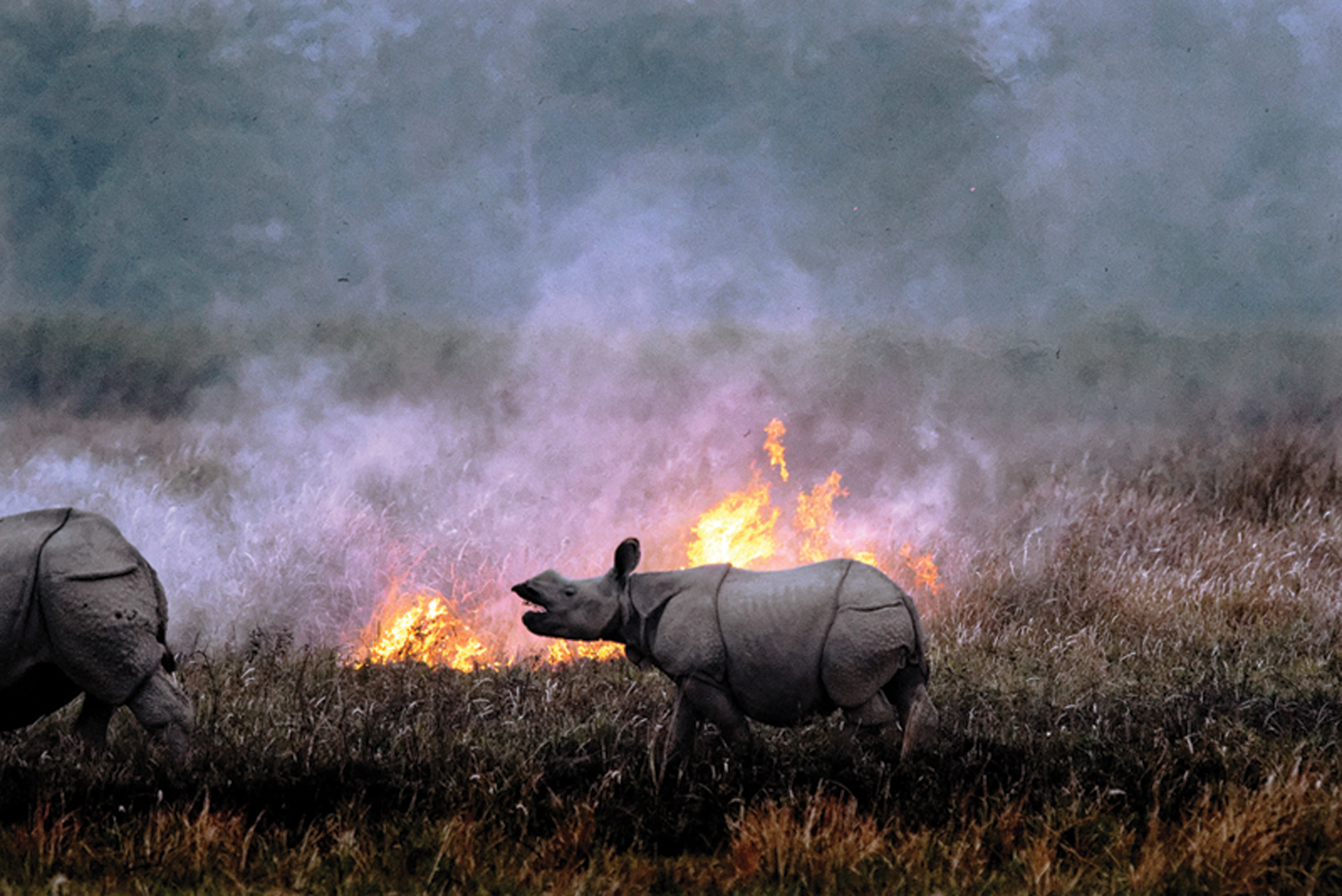
Burning the grassland just before pre-monsoon showers hit the region is a common practice in grassland management and is seen annually in all national parks or wildlife sanctuaries of Assam – particularly Kaziranga, which is a predominantly grassland ecosystem. Photo: Bijulal M.D.
Waves of Change
In September 2021, I travelled to the Kaziranga National Park (KNP) to meet with some of the 40 female rangers working here as Range Officers, forest guards, foresters, constables and staff.
The Kaziranga National Park has five major ranges: Burhapahar, Bagori, Kohora, Agoratoli and Biswanath. Burhapahar, the western-most range of the park hosts a special team of women under the State Rhino Protection Force (SRPF). The group comprises 74 men and eight women, patrolling each day to protect the vulnerable greater one-horned rhinoceros. I met four of these women at the Range Office. Just a regular group of women in their early 20s, sharing chatter and laughter, dressed in camo gear with rifles hanging from their shoulders. Their nails are painted, their fingers tightly wrapped around the comb of the SLRs (self-loading rifles). Their hands are adorned with bangles and water-proof watches. Their hair is tied in beautiful, compact waterfall braids, but neatly tucked inside their caps. Jonti Sarkar, Bhagyawati Gwala, Beauty Pegu and Sumala Doley joined together as SRPF in 2016 and since then, have become family. To the untrained eye and unacquainted mind, they look innocuous enough. “But don’t be fooled,” says Jukti Bora, Forester 1 of the Burhapahar range. “They are fierce.”
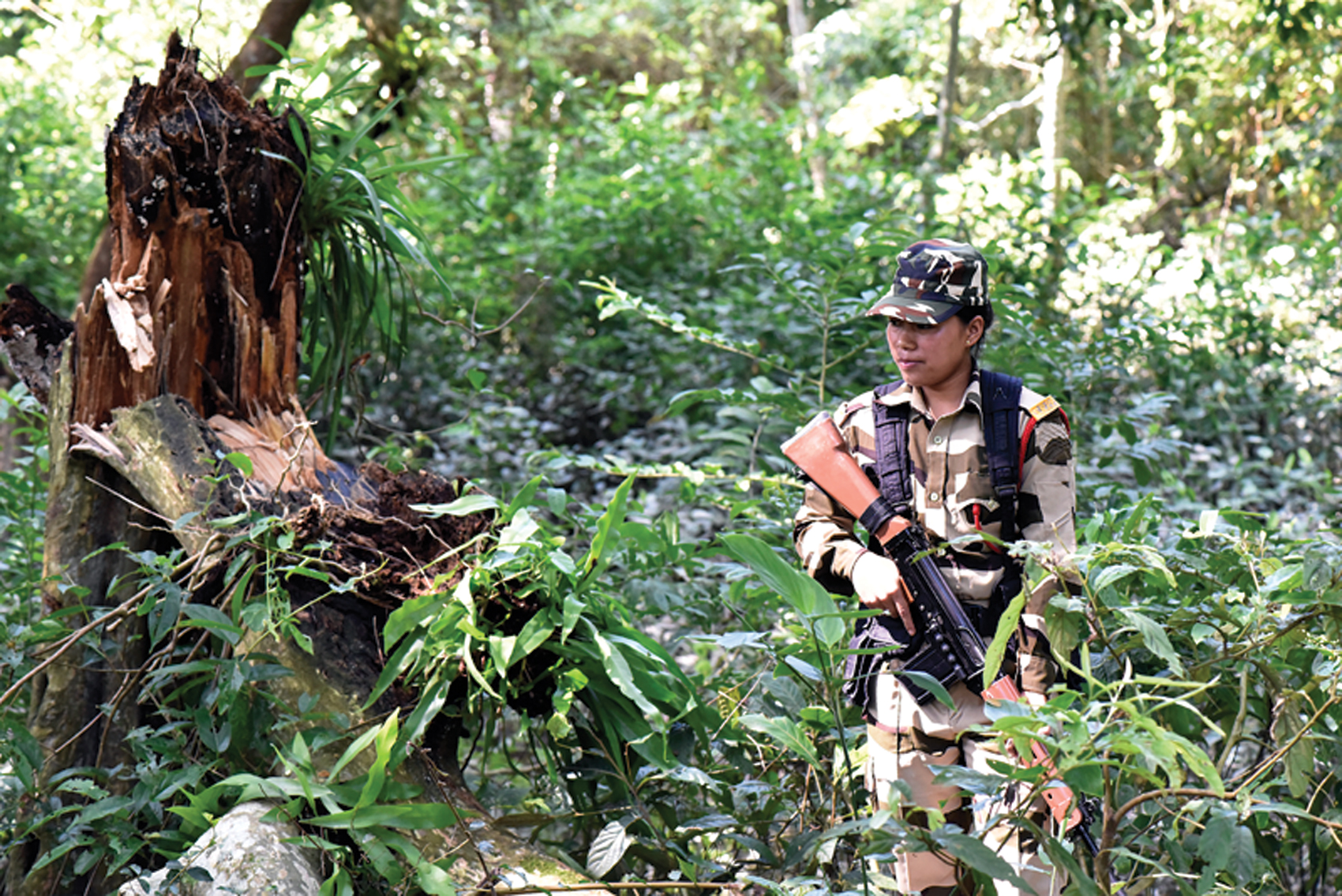
Ranger Beauty Pegu, SRPF, on duty in the Burhapahar range, Kaziranga National Park. She, Jonti Sarkar, Bhagyawati Gwala, and Sumala Doley joined the SRPF together in 2016 and since then, have become family. Photo: Ivy Farheen Hussain.
Duty and Deference
The duty of these rangers extends into the night, covering land and water, particularly in the monsoon when Kaziranga famously floods. Patrolling in Burhapahar and parts of Bagori, they are trained in river patrolling, night false fire drills, weapon handling, and highland duties to deter poachers. “I have not left a single stone unturned in training these girls,” says Pradip Goswami, current Range Officer of the Burhapahar range. He found inconsequential differences in their performances and in fact found women doing better than the men on occasion. During joint patrolling with the police, they are often the first line of defense, he says. Beauty Pegu comments, “Our police brothers depend on our SLRs and in turn, we depend on them for their encouragement.”
During their recruitment, around 2,000 women applied for the job. And understandably only a few were selected. “Though their training was physically tough, not once did I see a hint of regret in their eyes,” says Goswami. “Firing training, especially, has been crucial in my character development. Once the bullet is out of the trigger, no one can bring it back. We have to be careful,” says Sumala Doley. “Every day I put on my bangles, my bindi, pick up my gun and march to Kaziranga’s heart. I will not have my life any other way… I was born to do this.”
Working in difficult field conditions can be challenging, but a supportive work environment makes up for it. “There is an unspoken bond of understanding between our seniors and us… when they see us not in the best shape, they change patrol routes to accommodate us and our health. We, in turn, end up completing the patrol with greater mental focus,” says Sumala.
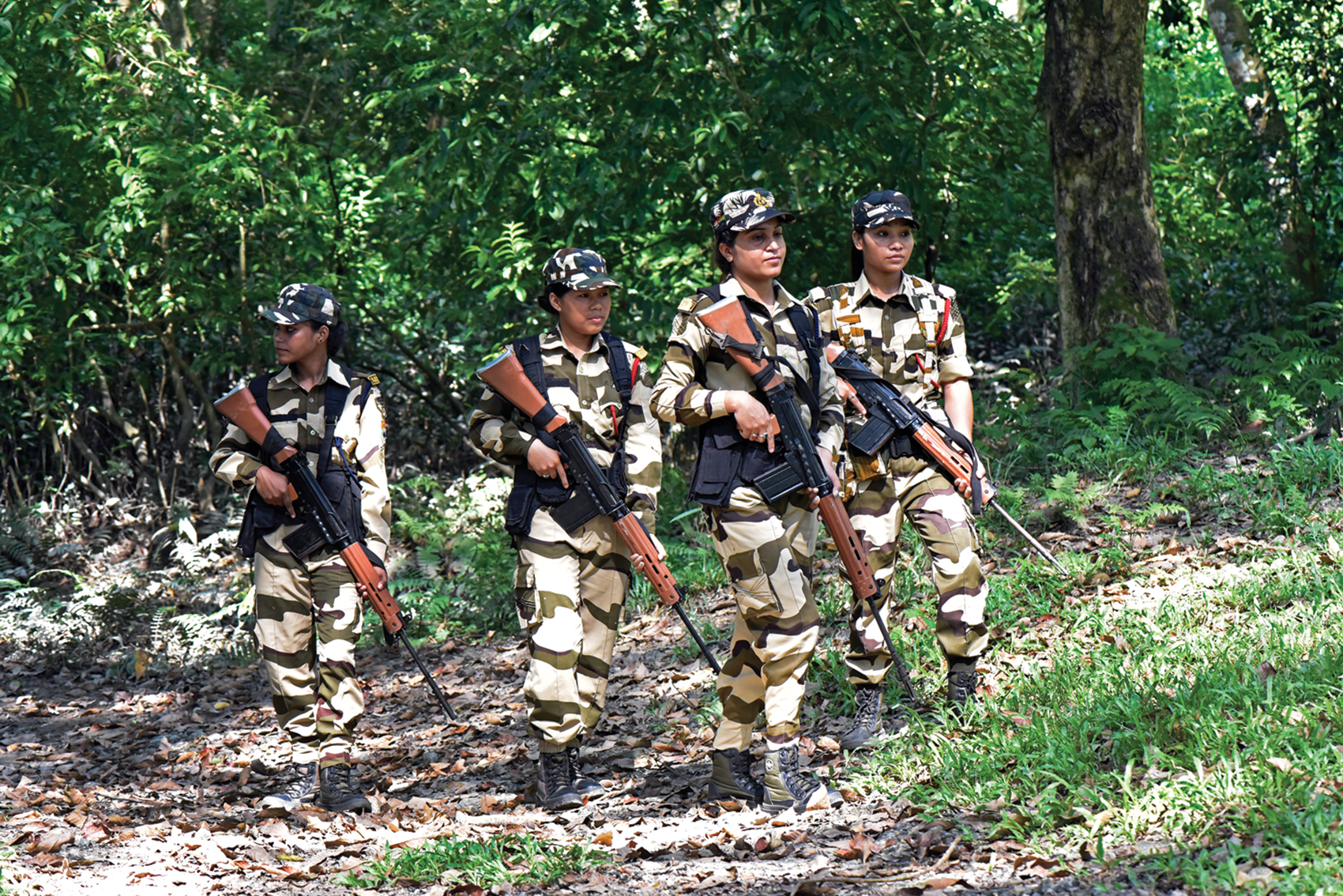
State Rhino Protection Force (SRPF) female rangers during a patrol in the Kaziranga National Park, Assam. The SRPF, which includes 74 men and eight women, is a dedicated force to monitor rhino poaching and related activities in the Kaziranga National Park. Photo: Ivy Farheen Hussain.
Family and Community
But it is not just the department that needs to be supportive. Coming from an adivasi family from Biwanath Chariali, Bhagyawati is the youngest of her siblings; she opted to join the protection force as an act of revolt. People around her, including her family, were terrified and argued, “How will you ever stay safe from people and animals?” But it was the body-shaming that really enraged her. Being thin and lean, she willed herself to run, exercise, and swim to a point when she became stronger than her brother! She joined the force and is now her family’s and village’s pride. “Everyone in my village now calls me the Protector of Kaziranga,” she says, smiling. None of the rangers are from a wildlife or forestry background – most of them are either graduates or high-school pass-outs. They tell me that protecting the greater one-horned rhino is the highest degree they can get.”
The communities residing around Kaziranga grew up seeing the forests, breathing the fresh air under the shade of century-old towering trees. They have seen the majestic creatures from their windows and heard their calls in their sleep. There’s a social phenomenon extensively studied in sociology called ‘supra-individual factor development’– contextual and environmental factors that influence our behaviour. Forest duty would seem a natural extension of their continuous exposure to wildlife. “They become experts at a very young age,” says Ramesh Gogoi, Divisional Forest Officer (DFO), Kaziranga National Park. “Almost daily, they encounter wild animals and have
the opportunity to witness their behaviour. This makes them sensitive to animal complexities, and when these people decide that their destiny is to protect them, that is a win-win for the wilderness and people.”
The community has also been a catalyst in the protection of Kaziranga. Bibha Sonowal, Forester 1, Kohora, tells me that no matter how poor, the fringe communities support education and profession in the forest, wildlife and enforcement fields. Married, with two sons, she has been serving as a part of the Assam Police Battalion in the Central Range of KNP for many years.
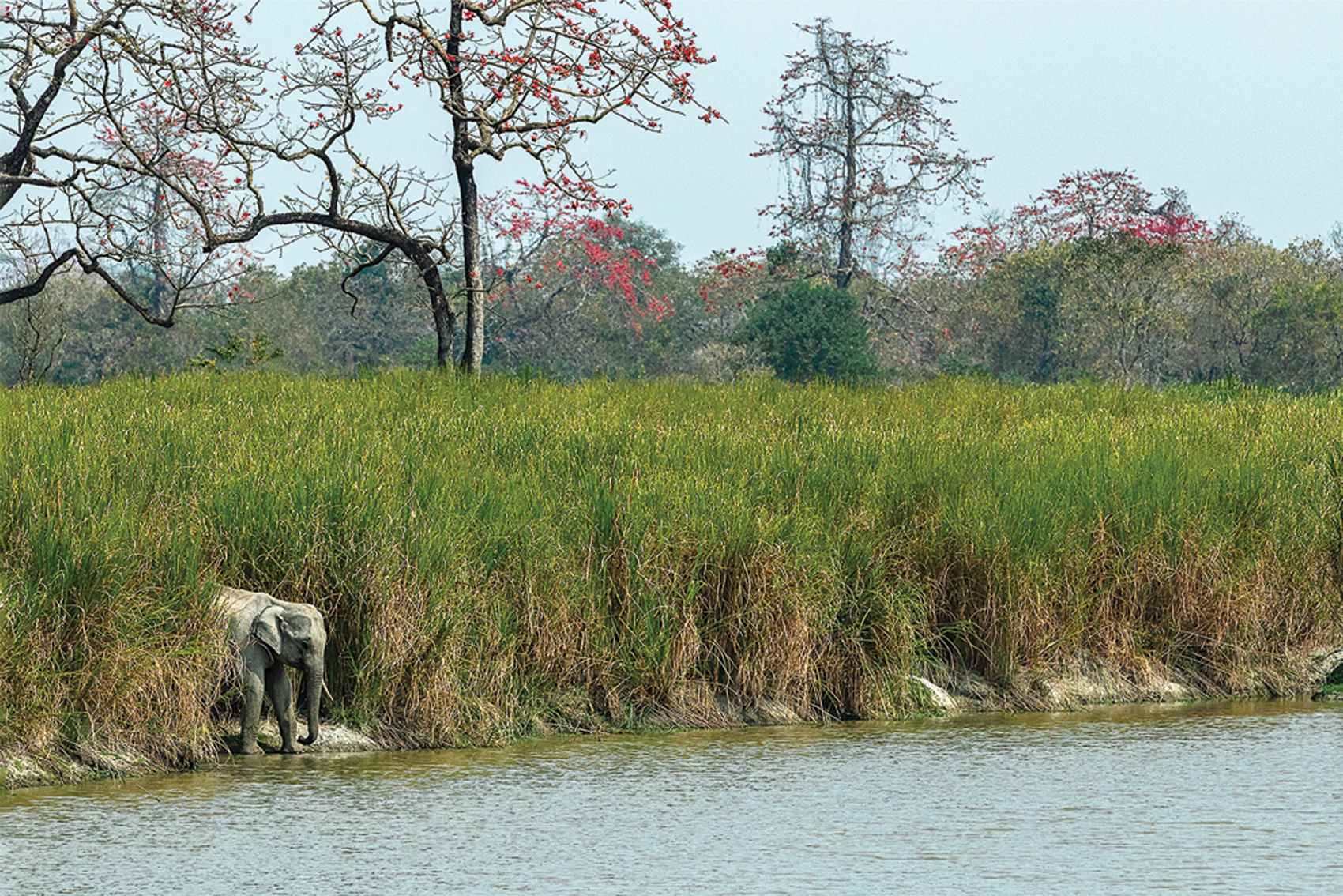
An elephant emerges through a thicket of tall grass for a drink at one of Kaziranga’s many waterbodies. Protecting the rhino has allowed Kaziranga to also be a haven for elephants, tigers and varied wildlife. Photo: Sourav Mukherjee.
Marriage v/s mission
When male staff are hired in areas of protection and enforcement, there is some concern about how their move would affect their wives’ or children’s life. When Bibha, the only girl child in her family and the only one among her brothers to carry on their father’s forest protection legacy, opted to work in the forest, no one batted an eyelid. Her two sons are incredibly proud of her, as are her in-laws. “There is nothing I cannot do. I love my sons, my husband, my family, and similarly, the forest. Hence, I look after all of them.”
Sometimes, it is also not uncommon to fall in love while working in the same field. This is what happened to Sumala, whose husband is currently also in the defense. He understands how crucial it is for both of them to have a job because every day they gamble with their life. The fact that forest ranging is a male-dominated area also gives rise to a taboo in the small hamlets the female rangers come from. Questions about ‘who they’re patrolling with’ becomes a bigger concern than the actual risks. In this context, family support is crucial. A colleague, Pallavi left in the early days of training because of lack of support. “We lost a talented and capable cadre,” Bhagyawati says. Sumala states matter-of-factly that she got married while she was in training but was back on duty the day after her wedding.
Support v/s Struggle
The Government and Forest Department of the Kaziranga National Park has played a crucial role in building a support system for these rangers. Jonti says she is incredibly grateful to the government for providing an opportunity for girls and women who dream of working in the forests and become front-line rangers. The government has already created several provisions regarding women in various workforces. However, this must be followed by participation, which becomes a possibility only when there is social acceptance. Society changes when individuals do. “The day parents open a savings account for their daughters for both their education and marriage is when we know society has changed,” Jonti says. “While money is not everything, money is, in the end, everything to a deprived household. Girls need to be motivated to earn their own.” It doesn’t take much time to completely give up on a system when cases of discrimination, sexism, prejudice and patriarchy come into play. But these women have moved past that with grace and gratitude. Bibha mentions how, by encouraging her sons, she is doing her duty for the future. Sumala adds, “I am here because my mother believed in me.”
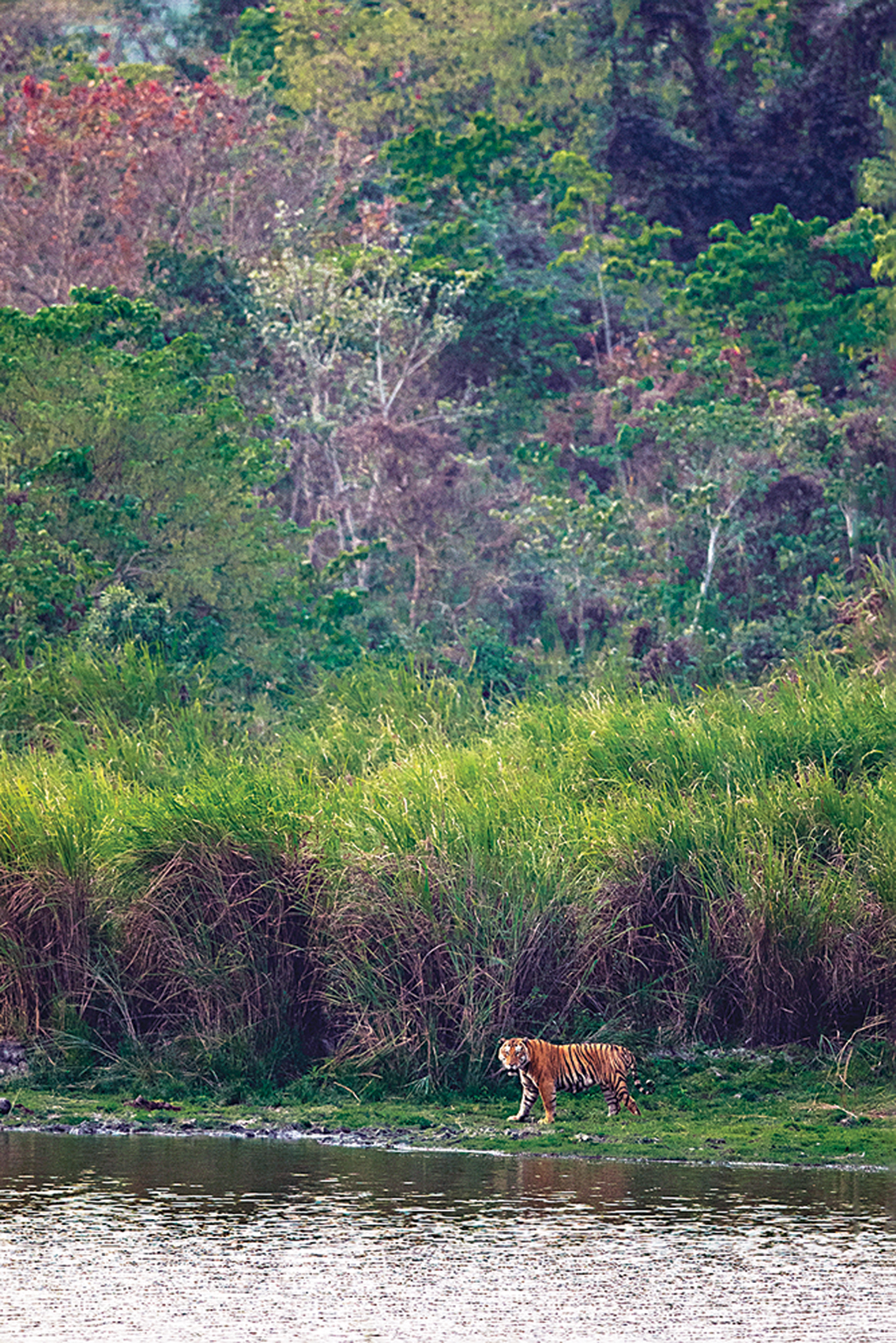
The community that lives around the national park has also been a catalyst in the protection of Kaziranga. The park has the highest tiger density in the world, with an average of 32 tigers per 100 sq. km. However, sightings of this apex predator are rare. Photo: Sourav Mukherjee.
Inspiration to many
Sometimes, it just takes one girl to change a tradition going back generations. “These girls have opened the door of possibilities to not only girls and boys in their villages, but also to parents and children all over the state. From tourists to officials, everyone is impressed with their diligent service. Their presence has inspired many and will continue to do so, I’m sure,” says Jukti Bora. The presence of women in enforcement has a lot of positives and comes in especially handy during raids. Often, these operations cannot be followed through precisely due to the absence of women in the team. “They are as good in management as in command,” adds Ramesh Gogoi.
While travelling between the ranges, I met other women in enforcement who, I later learned, were on deputation duty from the Assam Police. “These women patrol the highways here in KNP so efficiently, even in the blistering sun and rains. However, where they work full-time, they are mostly given filing duties in the offices. This is a huge waste of their potential. They are more than capable, but societal values are not easy to break,” says Gogoi. “I want to urge everyone, not only the Forest Department, to give women a chance to perform.”
There is still a long way to go for equal pay, equal participation and upliftment of women in the ranger force. “The field rangers have always been masqueraded as this exclusive macho boys club. Gender balance will take much work and interventions,” says Rohit Singh, Director, Wildlife Enforcement and Zero Poaching, WWF Wildlife Crime ACAI. He also serves as President, Ranger Federation of Asia. While women in Protection Forces – such as the Akashingas of Zimbabwe, Black Mambas of Africa and the Special Rhino Protection Force of Assam – are without doubt inspirational, projecting them only as such can also be counterproductive. “This gives rise to elitism in the force,” explains Singh. Within Kaziranga itself, there are many women who work in different enforcement agencies such as the police, SSB and Army. An emphasis on one group might create situations of inferiority complex and demotivation. By trying to uplift some women, we end up isolating other women. We need to celebrate women rangers under the current umbrella of rangers without having to create another day for them,” Singh states. He recalled how one of the first female forest guards from Rajasthan stood up in a forum and responded to a question of how women can be made to feel comfortable in the ranger workforce. She said, “Apne jaise man lo! (Take us as your equal!)”.
Miles to go Before we Preach
My journey to the Kaziranga National Park clarified my vision of how, on a daily basis, centuries-old perceptions are being changed. The work that women worldwide are doing is paving the way for previously unimaginable paths. If we can change societal constructs, we can change the attitude of individuals. Women front-line forest rangers in India have come a long way. From the sweltering Desert National Park in Jaisalmer in Rajasthan, to the dry and parched Gir National Park in Gujarat, to the wet, humid and inundated Kaziranga National Park in Assam, women are trail-blazing through India’s patriarchy.
Ivy Farheen Hussain is a Project Officer in the Tiger Research and Conservation Division of Aaranyak and works as a Wildlife Crime Analyst. She has worked in conservation since 2016 in and around Northeast India, is an avid birder and painter, and is passionate about community-oriented crime-specific conservation.
_C-1700_1648884580.jpg)
The author travelled to the Kaziranga National Park to meet with some of the 40 female rangers working here as Range Officers, forest guards, foresters, constables and staff. Photo: Ivy Farheen Hussain.
In the past few decades, the world has seen a swift rise in women’s participation in different fields. Female frontline rangers are becoming a common sight. In 2021, for the first time ever, June 23 was celebrated as ‘World Female Rangers Day’. The tagline was, “To be a ranger, you must first believe in yourself. If they can do it, so can you”.
Studies show that the global women task force is somewhere between three to 11 per cent, which is suggestively low. The Chitwan Declaration during the World Ranger Congress in 2019 was a crucial moment in the history of female rangers in getting recognition. It addressed subjects such as equalising gender in the workforce, reinforcing equal pay and providing support, protection, and promotion to female rangers.







_C-1700_1648884580.jpg)